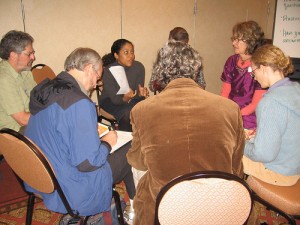A few years ago on a trip out of town I attended Sunday School and worship at a local church. With some difficulty, I found their information table and secured directions to a class. Upon entering the classroom, I notice a group of six people visiting. Not wanting to intrude I just waited. Reluctantly, after more than a minute and several glances, one person came to welcome me. Then he directed me to a seat on the front row, o bviously avoiding other class members’ favorite seats and returned to visit with his friends. Soon the class began, after several minutes of music, a greeting and a prayer, the music leader, looking a little uncertain said, “Well, I guess we will sing a couple of more songs, maybe Bill will be here by then.” It was at that moment I realized we still had no teacher, 30 minutes into the class. By the time we had finished the additional songs, the teacher finally arrived. The music leader introduced the teacher saying, “Wow, Bill, we did not know if you were going to make it today.” About five minutes into the lesson, the person who seated me on the front row jumped up and said, “Oh, I forgot, we have a guest today” (pointing at me) and saying, “What is your name?”
bviously avoiding other class members’ favorite seats and returned to visit with his friends. Soon the class began, after several minutes of music, a greeting and a prayer, the music leader, looking a little uncertain said, “Well, I guess we will sing a couple of more songs, maybe Bill will be here by then.” It was at that moment I realized we still had no teacher, 30 minutes into the class. By the time we had finished the additional songs, the teacher finally arrived. The music leader introduced the teacher saying, “Wow, Bill, we did not know if you were going to make it today.” About five minutes into the lesson, the person who seated me on the front row jumped up and said, “Oh, I forgot, we have a guest today” (pointing at me) and saying, “What is your name?”
In a recent consultation with a church, I discovered a powerful guest strategy at work. As people were arriving there were greeters welcoming people. As guests were indentified, the greeters strategically placed them in seats by couples or individuals who had already be recruited and trained to assisted first time guests. I learned that the people seated by the guest had a mission to befriend the guest for the entire day at church. They would try to build a relationship, answer questions, provide directions, and tell them about their experiences at the church. When the call for guests came, they would introduce the guest as their new friend. Just when I thought I had the picture, one of the greeters explained there was something else going on here. There are prayer warriors trained and committed to praying for guests each week. Once a greeter identifies a guest by seating them with someone committed to assisting guests, a prayer warrior begins to pray for the specific guest(s). There are as many prayer warriors as our typical number of guests.
Was one of these classes expecting guests?
____________________________________
Tom Belew has served as Small Groups and Childhood Specialist for the California Southern Baptist Convention since 2002. He previously served as Minister of Education in churches in Arizona and California.


